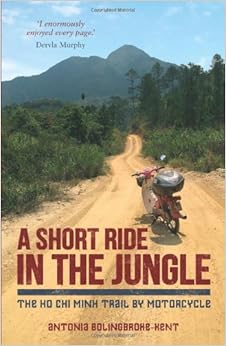UK-based Antonia Bolingbroke-Kent is an itinerant adventurer
and a travel writer. Her first book, Tuk-tuk
to the Road: Two Girls, Three Wheels, 12,500 Miles was an account of how
she and a friend drove a tuk-tuk from Bangkok to the UK. She followed up with A Short Ride In The Jungle: The Ho Chi Minh
Trail By Motorcycle, her account of seven weeks she spent discovering the
Ho Chi Minh Trail, alone, on a bike called The
Pink Panther, because of its pretty pink spray job.
Although Antonia is wary of giving details, her next book,
too, will be an account of a motorcycle ride through an area of Asia
little-known in the West. In the
meantime, she is currently visiting South East Asia, to write a magazine
article about biking northern Thailand’s Mae Hong Son Loop, famous amongst
bikers for being a route with 762 bends.
I met her over a cup of tea in Singapore.
Given that Antonia seems so keen on bikes, I asked her if
she thought of herself as a biker? “No. I’m
not a biker. I regard bikes as a cheap
mode of transport, one that enables you to see areas you couldn’t otherwise
reach.”
I thought a pink bike must have been a great ice-breaker? “Yes.
And being pink made the bike seem stupid, not threatening – it made me more approachable.”
She must have cut an unusual sight, a Western women alone on
a pink bike, in some out-of-the-way places. Did she ever feel endangered by men? “I did encounter some lechery, but even when
I ran out of petrol in the jungle, and one of the drunken men helping me refill
groped my boob, I just batted him away.
It was really just men trying it on – or being confused by the ‘hotels’
I was staying in – in Laos, these doubled as brothels – but I never felt at
risk from men. I think women travelling alone need to be aware of the possible
dangers, but they should not be put off having adventures.”
Still, why did she insist on travelling alone? “For me,
travelling alone is the only way to write a book. If I travel with companions, I worry I’m more
focused on them, than on the new people I’m meeting. I think travelling with other people makes you
less open to new experiences, than travelling alone.”
What about openness to self-discovery? Was that easier, if
you were alone? “I didn’t characterise
my journey as one of self-discovery. It
was more about discovering places, telling untold stories, getting new perspectives,
such as those of the American veterans I met along the way, or of UXO experts. Mind you, when I set off I did want to see how
I would overcome personal challenges – would I be able to cope with the various
problems the journey would throw at me? Getting lost. Encountering snakes. Even eating was complicated, because I'm vegetarian.”
So who was she telling the previously untold stories for? Who was her intended readership? “Primarily bikers
and other tourists visiting Vietnam, Laos, or Cambodia. I wanted to give them an insight into the history
of the area they were visiting, without writing an academic history – to weave the
story of my journey and history together. I also wanted to help them see beyond the sheen
of tourism, to the realities of local life.”
What had Antonia herself learned about those realities? What had surprised her, as she biked the Ho
Chi Minh Trail? “I was horrified that, 50 years after the War, UXO still causes
so much death. Hence I have used the book
to help spread the word about MAG, Mines Advisory Group, a not-for-profit
organisation working to clear landmines. I was surprised by the extent of the corruption
in Laos. In the West, it’s thought of as
a country of golden stupas and smiling monks, but there is rampant corruption
around mining, and around the pell-mell deforestation – I was kept up all
night, sometimes, by the loggers’ trucks.
I was surprised, too, by aspects of the sex trade – Vietnamese girls being
pimped out by their mothers. Then again,
even in the remotest villages in Laos, ya ba pills were available – I was
surprised by that.” (Ya ba is the Lao
name for the methamphetamine known elsewhere in South East Asia by many other
names – shabu, etc.)
It was quite a depressing list that Antonia had
reeled off. Were there no positive
surprises? “I found the Cambodians charming.
After all the problems they have endured, it was wonderful to find them
so welcoming, and generous.”
Turning from Antonia’s journey, to other people’s adventures,
I wondered if she had any advice for would-be travel writers? “Get out there
and have experiences you can write about! Travel writing is about the story, or
the stories, you can tell, and about the characters you meet. To make a career
of travel writing, you need perseverance, and passion. You need to understand travel writing is not
a road to riches.”
Buying the book
The paperback print edition of A Short Ride In The Jungle, published by Summersdale, is widely
available in Asia, priced in local currencies.
The eBook is available through Amazon UK.

